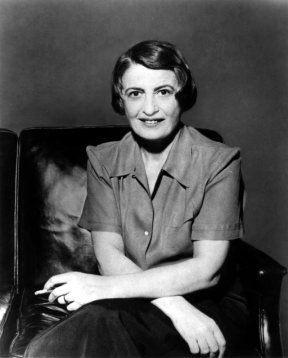February 2: Ayn Rand
Ayn Rand (1905)
It was on this date, February 2, 1905, that Objectivist philosopher and author Ayn Rand was born Alissa Zinovievna Rosenbaum to Jewish parents in St. Petersburg, Russia. She always knew she wanted to be a writer. As a young girl, Alissa witnessed the Bolshevik Revolution and saw firsthand the brutality of the Soviet regime. The Communists nationalized her father's shop, reducing the family to poverty. At age 21 she got permission to travel to the US and, after a brief stay in Chicago, traveled to Los Angeles to become a screenwriter.
It was 1925, Lenin was dead, but fearing for the safety of her family still in Russia, Alissa Rosenbaum changed her name to Ayn Rand. She published We the Living in 1936, The Fountainhead in 1943, and her most memorable if unreadable work, Atlas Shrugged, in 1957 (film, 2011). Her novels outline her philosophy of Objectivism. "My philosophy, in essence," she wrote in her Appendix to Atlas Shrugged, "is the concept of man as a heroic being, with his own happiness as the moral purpose of his life, with productive achievement as his noblest activity, and reason as his only absolute."
Briefly, because Objectivism teaches that reality exists independently of perception, there is no cause for belief in the supernatural; that reason is a sufficient tool for perceiving and dealing with reality; that because humans are rational, determinism is rejected: humans are not victims of forces beyond their control; that because humans are an end in themselves (an idea she borrowed from the despised Immanuel Kant), altruism is rejected in favor of rational self-interest as a motivator; that because no one has the right to take from others by force, "the only function of the government is to protect individual rights, i.e., to protect men from those who initiate the use of physical force."
Because of her visceral revulsion at Soviet Communism, Rand rejected even a "mixed" economy of Socialism and Capitalism, favoring instead the chimera of "pure" laissez-faire Capitalism — which tends toward consolidation and oligarchy. This would seem to make her Objectivism popular with economic and social conservatives. Yet Rand also rejected religion, which would have made Objectivism popular with Leftists — until she appeared in 1947 as a "friendly witness" for the House Committee on Un-American Activities. Instead, her following has (at least until today) remained quite small, attracting mostly anarchist-leaning Libertarians and true believers, and her doctrines are supported by an ever-diminishing cult of personality following a substitute faith (as Albert Ellis charged). Her only following in this day and age appears to be conservative Libertarians masquerading as Republicans.
In a time when most Capitalists identified "godless" with "Communism," Rand "was identifying religion and communism as brothers under the skin. ... Both subordinated man to a higher power: religion to god, communism to the state."[1] Rand "held firmly to atheism throughout her life; and she felt it just as important to fight the witch doctor's mysticism as Atilla's collectivism."[2]
In For the New Intellectual, Rand wrote,
For centuries, the mystics of spirit had existed by running a protection racket — by making life on earth unbearable, then charging you for consolation and relief, by forbidding all the virtues that make existence possible, then riding on the shoulders of your guilt, by declaring production and joy to be sins, then collecting blackmail from the sinners.[3]
"Religion," Rand noted, "is the first enemy of the ability to think. ...yet before they learn to think [men] are discouraged by being ordered to take things on faith. Faith is the worst curse of mankind, as the exact antithesis and enemy of thought."[4] Ayn Rand died of heart failure in New York City on 6 March 1982. "It is not I who will die, it is the world that will end," she said, perhaps forgetting that Objectivism does not permit one to create or invent reality.[5]
[1] James T. Baker, Ayn Rand, 1987. [2] Ibid. [3] Ayn Rand, For the New Intellectual, (essay of the same title), 1961. [4] Ayn Rand, private notes, 1934, quoted in Barbara Brandon, The Passion of Ayn Rand, 1986 (the first full-length biography of Ayn Rand, written by a student and personal friend). [5] From the website "Essentials of Objectivism" at this link.
Originally published January 2004 by Ronald Bruce Meyer.


